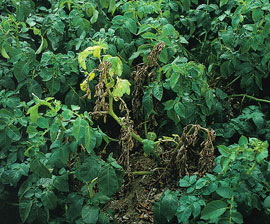Dickeya solani forces destruction of NI potato crop

A seed potato crop in Northern Ireland grown using seed imported from The Netherlands has been destroyed after aggressive black leg variant Dickeya solani was detected.
The Department of Agriculture and Rural Development in Northern Ireland demanded that the crop, growing in a key seed producing area of County Down, was destroyed.
NI agriculture minister Michelle O’Neill said: “Following a meeting with the importer and growers, we have ordered the immediate destruction of the infected crop and subsequent restrictions on the use of the land for potato production. I wish to re-assure the local industry that actions are being taken to ensure that this outbreak can be fully contained.”
Jim Crummie, chief potato inspector for Northern Ireland said the grower failed to have the crop tested by the department prior to planting. “Two years ago we put a scheme in place, which means growers need to inform the department of all imported seed,” he said.
But although the grower of the affected crop informed the department, some of the seed was planted before testing could be carried out. Mr Crummie said seed potato legislation would be strengthened in October to make it more difficult for growers to plant infected seed.
Northern Ireland has no equivalent of the Safe Haven Scheme in place in Scotland and England, but the department would be support the industry if it wished to implement such a system, said Mr Crummie.
Ms O’Neil urged growers, merchants and seed importers to carefully consider the risks of introducing seed from areas known to have Dickeya solani.
“The continued freedom of the local industry from this damaging bacterial pathogen will maintain the competitiveness of our ware and seed industry,” she said. “It will also enhance our reputation as a source of healthy seed potatoes.”
Martin Hamilton, a potato grower in Co Down said it was crucial the region remained free of diseases such as Dickeya solani. “We have first-class seed growers in Northern Ireland and I don’t understand why some people are importing from The Netherlands.”
Mr Hamilton said he only sourced seed from selected producers in Northern Ireland and Scotland and supported any moves to protect against the influx of disease from imported seed crops.
Similarly, James Wray from Co Londonderry sourced all his seed from Northern Ireland.
“I’m strongly against bringing in foreign seed. We have such a strong, vibrant seed market, there is no need for it,” he said.
